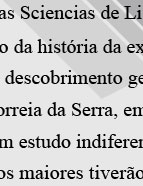

................................
The last quarter of the 20th century was marked by the influence of historians such as Joel Serrão (1919-2008), Jorge Borges de Macedo (1921-1996), Albert Silbert (1915-1996), Vítor de Sá (1921-2003), A. H. de Oliveira Marques (1933-2007), Miriam Halpern Pereira (1937-), and César de Oliveira (1941-1997) who, from diverse perspectives, were noteworthy for the breadth of their methodological, chronological, and thematic proposals. Nevertheless, the analysis of the political phenomenon was always present in their work, whether closely or from a distance, paving the way for the next generation, which would be influenced by a different international context.
From the late 1980s onwards, especially after the fall of the Berlin Wall, although its origins were slightly earlier, a movement emerged advocating a return to the old political history as a critical counterpoint to the afore-mentioned new political history. The primary driver of this "conservative" return was the American historian Gertrude Himmelfarb (1922-2019) with her The New History and the Old: Critical Essays and Reappraisals (Harvard University Press, 1987), where she argued that there is only one way to historicise: by narrating political events precisely as they are described and translated by documents. For Himmelfarb, only the political is history, and History in its entirety can only have politics as its object of study. In contrast, the new history had a natural aversion to the field of politics, although its authors essentially spoke the same language. Pierre Nora (1931-) spoke of the "return of the event," Lawrence Stone of narratives, and Jacques Julliard of political history, but this new political history, being too close to sociology and too quantitative, had a particular distaste for politics. The alternative was a return to the narrative, to the description of the succession of events, finding a causal link that unified them. History thus conceived and written, although not fiction, blurred its specificity concerning fiction. Hayden White (1928-2018) contributed to this with his typology of different historiographical discourses as rhetoric in his work Metahistory: The Historical Imagination in Nineteenth-Century Europe (1973). It was time to herald the end of history as a social science.
